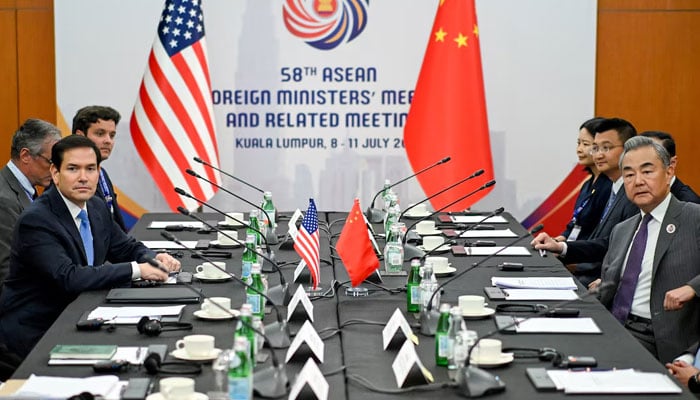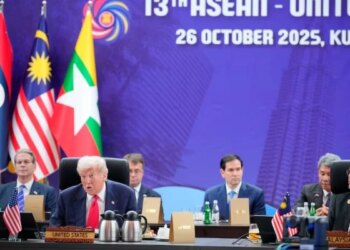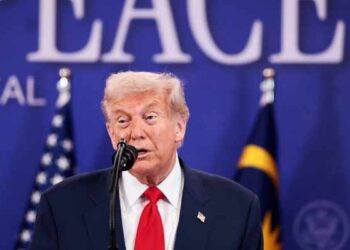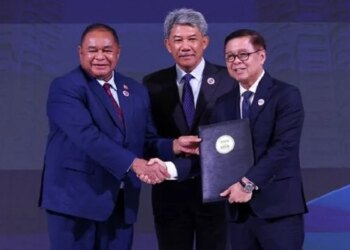Select Language:
Meeting of US and Chinese Diplomats Highlights Trade Tensions
KUALA LUMPUR – US Secretary of State Marco Rubio met with Chinese Foreign Minister Wang Yi in Kuala Lumpur on July 11, 2025, amid ongoing tensions concerning recent US trade tariffs. This encounter took place during the 58th ASEAN Foreign Ministers’ Meeting, where multiple global leaders convened to discuss pressing issues.
Rubio’s visit marks his first trip to Asia since assuming office. He’s participating in the East Asia Summit and the ASEAN Regional Forum, engaging with officials from Japan, South Korea, China, Russia, Australia, India, the European Union, and various Southeast Asian countries.
The backdrop of their discussions included rising global discord regarding President Trump’s tariffs. Earlier this week, China cautioned the United States against the proposed reinstatement of hefty tariffs, set to go into effect next month. Furthermore, Beijing has warned of potential retaliation against countries that align with the US in diminishing China’s role in supply chains.
Rubio’s mission aims to refocus attention on the Indo-Pacific region, seeking to shift away from the Middle Eastern and European conflicts that have predominantly governed the Trump administration’s foreign policy. However, this initiative has been overshadowed by recent announcements of steep tariffs impacting numerous Asian countries and US allies. These tariffs include a 25% increase for Japan, South Korea, and Malaysia; 32% for Indonesia; 36% for Thailand and Cambodia; and a staggering 40% for Myanmar and Laos.
Analysts suggest Rubio’s goal is to advocate for the US as a stronger partner compared to China, which is regarded as Washington’s primary strategic competitor. On his agenda, Rubio has met with counterparts from Thailand, Cambodia, and Indonesia, emphasizing the importance of the Indo-Pacific region to US foreign policy.
Criticism from China
China’s Wang Yi has been vocally critical of the US tariffs, labeling them as “unilateral bullying” that no nation should support. In conversations with Malaysia’s foreign minister, Wang emphasized that these tariffs do significant harm to the free trade system and disrupt global production and supply chains.
During his meeting with Cambodia’s foreign minister, Wang expressed that the US tariffs infringe upon Southeast Asian countries’ right to develop independently. He asserted, “Southeast Asian nations have the resilience to navigate these challenges while maintaining their core interests”, according to a statement from China’s foreign ministry.
Moreover, the Foreign Secretary of the Philippines, a US ally, revealed that President Ferdinand Marcos Jr. is expected to meet Trump in Washington this month to address various topics, including the rising US tariffs affecting the Philippines.
Rubio and Wang did not make any public remarks at the beginning of their discussions, which lasted approximately an hour and marked their first face-to-face meeting since Rubio took office in January. In prior comments, Rubio indicated plans to address US concerns regarding China’s support for Russia amidst the conflict in Ukraine.
Additionally, Rubio engaged with Japan’s foreign minister and South Korea’s first vice foreign minister on regional security and the enhancement of their trilateral partnership in critical technologies and supply chains, reflecting the US State Department’s priorities.
ASEAN’s Collective Response
In a joint statement issued on Friday, ASEAN foreign ministers voiced concerns over growing trade tensions and global uncertainties. Though the US was not explicitly named, the statement referenced unilateral tariffs as “counterproductive,” reflecting sentiments expressed by ASEAN leaders in previous discussions. They called for diversifying trade with emerging partners and stressed the necessity of a transparent, equitable multilateral trading framework.
The ASEAN representatives affirmed their commitment to constructive collaboration with all partners towards these goals.






